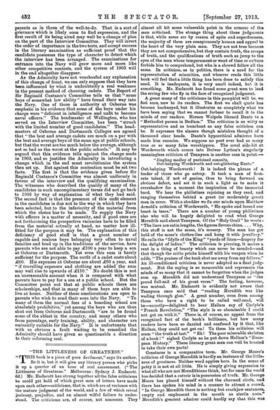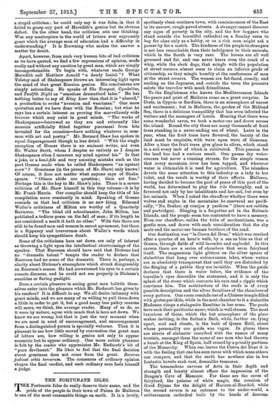"THE LITTLENESS OF GREATNESS."
"THIS book is a piece of pure devilment," says its author. So it is, but it will give any literary person who picks it up a quarter of an hour of real amusement. (" The Littleness of Greatness." Melbourne : Sydney J. Endacott. 6d.) Mr. Endacott has strung together all the false criticisms he could get hold of which great men of letters have made upon each other—criticisms, that is, which are at variance with the mature judgment of the world, and a few of which reveal jealousy, prejudice, and an almost wilful failure to under- stand. The criticisms are, of course, not nonsense. They almost all hit some vulnerable point in the armour of the man criticized. The strange thing about these judgments is that, while some err by reason of spite and superfineness, the majority of them are conspicuously human and appeal to the heart of the very plain man. They are not true because they are not comprehensive, but they contain truth, the scraps of truth, and the qualifications of truth such as jump to the eyes of the man whose temperament or want of time or culture forbids him to comprehend, but who is a shrewd fellow all the same. In criticism, as in politics, there is a need for the representation of minorities, and whoever reads this little book will feel that a little thing has been done to satisfy this need. It is inadequate, it is very small indeed, but it is something. Mr. Endacott has found some great men to lead the erring few who fly in the face of recognized judgment.
A great many of the criticisms in this pamphlet will be, we feel sure, new to its readers. The first we shall quote has become hackneyed, but it illustrates so completely what we have been saying that we cannot forbear to recall it to the minds of our readers. Horace Walpole likened Dante to a "Methodist parson in Bedlam." The criticism is as witty as representative and as trenchant as any false criticism can be. It expresses the sincere though mistaken thought of a thousand clear heads. Dante's hypocritical admirers have made him enemies. We suppose no poet ever had so many true or so many false worshippers. The cruel side-hit at Wordsworth which comes into Bulwer Lytton's singularly meaningless criticism of Tennyson is another case in point
"Jingling medley of purloined conceits, Out-babying Wordsworth and out-glittering Keats."
Out-babying Wordsworth I It is indeed the phrase of a leader of those who go astray. It took a man of first- rate talent, if not of genius, thus to bring forward an obvious defect, and set it in such a light as to make it overshadow for a moment the inspiration of the immortal bard. We hear the philistines rejoicing as they read, and ranging themselves behind a great (or moderately great) man in error. With a shudder we fix our minds upon Matthew Arnold's criticism of Wordsworth, "He spoke and loosed our heart in tears." There are a number of young philistines also who will be hugely delighted to read what George Meredith said about Tennyson. Of the "Holy Grail" he wrote : "The lines are satin lengths, the figures Sevres china. . . . Why, this stuff is not the muse, it's museiy. The man has got hold of the muse's clothes-line and hung it with jewellery." He calls the "Idylls of the King" "yards of linen—drapery for the delight of ladies." The criticism is piercing, it makes a rent in a thing of beauty which can never be mended—and that though the critic pricks himself with his weapon when he adds, "The praises of the book shut me away from my fellows." An ill-conditioned criticism is never adopted as a final judg- ment. But the saying is so memorable and represents the minds of so many that it cannot be forgotten when the judges sum up. Meredith did not understand Tennyson or "the proud full-sail of his great verse." The feeling, however, was mutual. Mr. Endacott is evidently not aware that Tennyson once said that "reading Meredith was like wading through glue." A great number, even from among those who have a right to be called well-read, will be—secretly—delighted to hear Hallam say of Carlyle's "French Revolution," "The style is so abominable I could not get on with it." There is, of course, no appeal from the recognized fact of the book's brilliance, but how many readers have been so dazzled and confused by it that, like Hallam, they could not get on! To them his criticism will seem "the truth at last." " Eh ! The poor miserable skeleton of a book !" sighed Carlyle as he put down Hallam's "Euro- pean History." These literary great men can well be trusted to take their own parts!
Greatness is a comparative term. Mr. George Moore's criticism of George Meredith is hardly an instance of the little- ness of greatness. Neither word applies here. In the sense of petty it is not at all little. He is simply giving expression to what all who are not Meredithians think, but for once the world has decided that a coterie is in possession of truth. Mr. George Moore has placed himself without the charmed circle, and there has spoken his mind in a manner to attract a crowd. "In George Meredith there is nothing but crackja.w sentences, empty and unpleasant in the mouth as sterile nuts?' Meredith's greatest admirer could hardly say that this was
a stupid criticism ; he could only say it was false, in that it failed to grasp any part of Meredith's genius but its obvious defect. On the other hand, the criticism sets one thinking. Was any masterpiece in the world of letters ever supremely great which the average man of education had a difficulty in understanding? It is Browning who makes the answer a matter for doubt.
Apart, however, from such very human bits of bad criticism as we have quoted, we find a few expressions of opinion, made coolly and without any emotion by great men, which are simply incomprehensible. To begin with, whatever made George Meredith call Matthew Arnold "a dandy Isaiah "? What Tolstoy said of Shakespeare throws an interesting light upon the mind of that great Russian genius. His conclusions are simply astounding. He speaks of The Tempest, Cymbeline, and Twelfth Night as "senseless dramatized tales." He has nothing better to say of King Lear than that it is "absurd," a production to evoke "aversion and weariness." One more quotation and we have done with the Russian ; but what he says has a certain interest as proving the marvellously wide lacunae which may exist in great minds. "The works of Shakespeare—borrowed as they are and externally like mosaics artificially fitted together piecemeal from bits invented for the occasion—have nothing whatever in com- mon with art and poetry." Mr. Bernard Shaw has spoken in equal disparagement though in less detail. "With the single exception of Homer there is no eminent writer, not even Sir Walter Scott, whom I despise so entirely as I despise Shakespeare when I measure my mind against his." Is that a joke, or a bond-fide and very amusing mistake such as the poet Greene made when he called Shakespeare "an upstart crow" ? Greatness (in the person of Mr. Shaw) only knows ! Of course, it does not matter what anyone says of Shake- speare. "Others abide our question ; thou art free." Perhaps this is the key to Mr. Shaw's joke. There is a severe criticism of Mr. Shaw himself in this tiny volume—it is by Mr. Frank Harris. Our compiler should keep the title of his compilation more constantly in mind. Speaking of Greene reminds us that bad criticism is no new thing. Edmund Waller's criticisms of Milton are worthy of a Quarterly Reviewer. "The blind old schoolmaster, John Milton, has published a tedious poem on the fall of man ; if its length be not considered a merit it bath no other." With this there are still to be found men and women in secret agreement, but there is a flippancy and irreverence about Waller's words which should keep his sympathisers dumb.
Some of the criticisms here set down are only of interest as throwing a light upon the intellectual shortcomings of the speaker. That Emerson should have said that Dickens had no "dramatic talent" tempts the reader to declare that Emerson had no sense of the dramatic. There is, perhaps, a clarity about Dickens's atmosphere which struck disagreeably on Emerson's senses. He had accustomed his eyes to a certain roseate dimness, and he could not see properly in Dickens's sunshine or flaring gaslight.
Does a certain pleasure in seeing great men belittle them- selves enter into the pleasure which Mr. Endacott has given to his readers? It is difficult to say. We all desire intimacy with great minds, and we are many of us willing to pull them down a little in order to get it, but a good many less paltry reasons will move, we think, the average reader. Many of us do, as it were by nature, agree with much that is here set down. We know we are wrong, but that is just the very moment when we are most in need of encouragement, and encouragement from a distinguished person is specially welcome. Then it is pleasant to see how little moved by convention the great men of letters are, how willing is genius not only to appear eccentric but to appear ordinary. One more subtle pleasure is felt by the reader who appreciates Mr. Endacott's bit of "pure devilment." He likes to feel that the final decision about greatness does not come from the great. Securus judicat orbis terrarum. The consensus of ordinary opinion shapes the final verdict, and each ordinary man feels himself a judge.











































 Previous page
Previous page